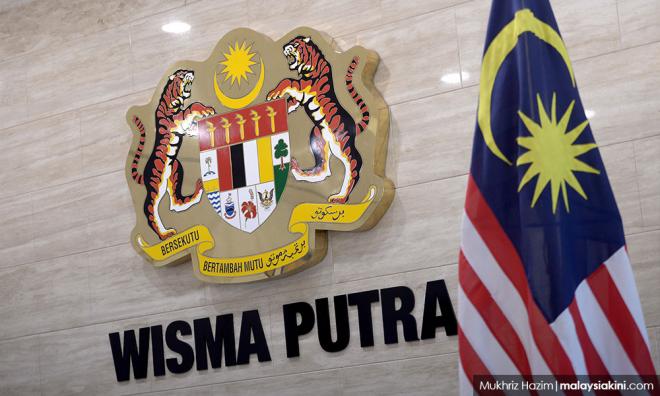
Since Perikatan Nasional came into power on March 1, Prime Minister Muhyiddin Yassin has appointed three special envoys.
PAS president Abdul Hadi Awang was the first to be appointed (read “rewarded”) in early April, followed by PDP president Tiong King Sing two weeks later. SUPP deputy president Richard Riot’s appointment came some 10 days ago.
Hadi Awang is Special Envoy to the Middle East; Tiong to China while Riot has been assigned to East Asia, notably Japan, South Korea and Taiwan.
These lucky guys are not your ordinary ambassador or high commissioner. They are the “special” ones.
Members of the diplomatic corps who have served possibly their entire life at Wisma Putra may never get to reach the top - that is to be an ambassador or high commissioner.
And here comes those with no diplomatic credentials appointed as special envoys, with ministerial status to boot.
We can’t blame the diplomatic corps for feeling that they must be in the wrong profession. To be “special” ones, they must surely realise now that the shortcut to the top is through politics.
Otherwise, they will just be career diplomats, serving from country to country either as second or first secretaries at a foreign mission.
Ambassadorial vacancies are few and far in between. Then again, some envoy posts are given to retired politicians or senior civil servants from other departments as “farewell positions” in recognition of their distinguished services to the nation. Well, supposedly.
I can recall a few examples off-hand of my fellow Sarawakians who were politicians but had served as diplomats overseas.
Two former Sarawak deputy chief ministers, the late Dunstan Endawie and Daniel Tajem, had served as high commissioner to New Zealand in the early 80’s and 90’s.
In 2003, former deputy inspector-general of police Jamil Johari was appointed Malaysia’s high commissioner to Brunei following his retirement from the police force.
Those were “normal” diplomatic appointments without the upgraded ministerial rank accorded to politicians who are made special envoys today.
Malaysians must be wondering about the functions of a special envoy. What is his specific job scope? No one really has a clear answer to that poser.
Upon receiving his letter of appointment as the prime minister’s special envoy to Japan, South Korea and Taiwan, Riot told a Sarawak daily that his first few tasks at the moment were confidential.
I wonder what is so confidential about the work of an envoy. Is the job similar to that of a CIA operative, for example? Or is the envoy privy to classified documents pertaining to espionage and imminent warfare? Just let us know what is the job scope, otherwise, there will be no end to speculations.
Out of curiosity, I googled the functions of a special envoy and this is what Wikipedia tells us:
“Special envoys of the prime minister are individuals, usually politicians, appointed with specific assignments to enhance the relationship between Malaysia with particular states or regions where Malaysia has considerable economic interests and cultural similarities.
“A contrast to that of ambassadorial appointments, Malaysian special envoys are not appointed by the Yang di-Pertuan Agong (King of Malaysia) as head of state, but rather direct appointees of the head of government, the prime minister of Malaysia.
“They are often appointed with the rank equivalent to a minister. Special envoys are often accorded a team consisting between four to eight personnel, usually including a senior private secretary, special officer, two special assistants and some with a police escort.
“Although most special envoys have been appointed with ministerial rank, the salaries drawn have varied depending on the portfolio. Known individuals who have served in this capacity without drawing any salary include Ong Ka Ting and Tiong King Sing during Tiong's first posting to East Asia. Nevertheless, Ong was listed as receiving a monthly salary of RM20,000 during his earlier terms as special envoy.”
That does not tell us anything about their specific functions.
This is why we have valid reasons to question such appointments as we already have ambassadors in almost every country to represent Malaysia. Talking about job duplication, this is one.
These appointments have always been viewed as rewards for political figures and aptly described as one of Muhyiddin’s reckless acts of appeasement to keep his political allies happy and content.
Two nights ago, I shared this cheeky message with friends, saying that I also desire to be a special envoy:
“I want to apply for a job as a special envoy. Can anyone help me draft a letter of application to the prime minister?
“It must have been like 40 years since I last applied for a job, and I have really forgotten how to write a job application letter.
“Since the Middle East, China and East Asia have been taken, I want to be the Prime Minister’s Special Envoy to the UK - Ulu Kapit (P/S Don’t forget to insist on ministerial rank).”
And I believe that is what many of us think. The appointment of special envoys is nothing but a silly joke.
FRANCIS PAUL SIAH heads the Movement for Change, Sarawak (MoCS) and can be reached at sirsiah@gmail.com. - Mkini



In Malaushia anything can happen. The no.1 criteria is the ability to buttlick your pm. Other than that is not important.
ReplyDelete